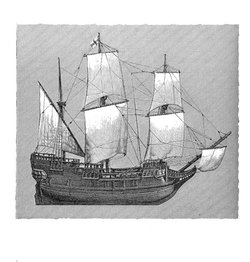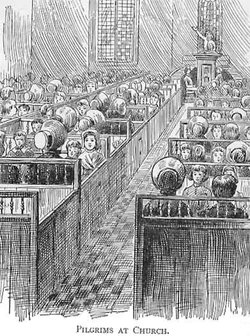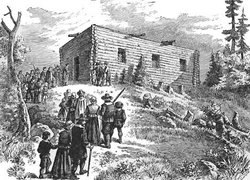Pilgrims
|
|
The Pilgrims were a group of English religious separatists who sailed from Europe to North America in the early 17th century, in search of a home where they could freely practice their Puritan style of religion and live according to their own laws.
Experiences and politics in Europe
The various members of the group had broken away from the Church of England, feeling that the Church had not completed the task begun by the Reformation. Under the guidance of the Reverends William Brewster and Richard Clifton, a portion of the group left their home in Scrooby and sailed to Amsterdam to escape religious persecution at the hands of their countrymen. They settled in Leiden for 12 years, but by 1617 a poor economy and concern over the Dutch influence on their community convinced many of them to move on, this time to the New World.
Concerned with the morals of the time in the Netherlands, and with their children's being brought up in a Dutch environment, they decided to move to a place better suited to them, and in 1620 set sail on the ship Mayflower from Plymouth, bound for the Americas. These people became known as the Pilgrim Fathers.
Another way of explaining the atmosphere in the Netherlands is that some of the exiles, such as Brewster, were publishing what the English government saw as seditious books and sending them into England. The English put diplomatic pressure on the Dutch government to stop it, the Dutch government began to comply and the exiles decided that it was time to leave.
With hindsight, it is natural to regard the Spanish threat to England as dealt with by the defeat of the Armada of 1588 but this was not the only nor last threat from that quarter (there were other armadas in other years and the Gunpowder Plot occurred in 1605) and suspicion of Spanish intentions continued into the reign of James I of England, if only in the minds of the English, as a conditioned response to the hard-line policy of the by then, dead king Philip II of Spain. The English government was thus trying to plot a course between the position of the Roman Catholic, Philip III of Spain and the Congregationalism advocated by Brewster and others.
At the time, fewer than half of the Congregation's members chose to leave the Netherlands aboard the Speedwell and sail to Southampton, England, where they joined a larger group of religious separatists aboard the Mayflower. After stopping at Plymouth, England they departed on September 6, 1620, with 102 people aboard. Their intended destination was a section of land in the area called Northern Virginia granted by one of the Brewster family friends in the London Company. This grant would have placed them near the Hudson River.
Arrival in America
Forced off course by typical North Atlantic weather, the Mayflower arrived at Cape Cod after 65 days at sea and anchored near present-day Provincetown on November 21.
Realizing that it would require a significant additional voyage to reach their goal, the Pilgrims chose to abandon their original plans and form a community where they were. Having no legal authority to colonize the area, they met to sign their own charter, known as the Mayflower Compact, in which they agreed to form a self-governing community.
The New Life
The Pilgrims' lives were not easy once they landed, however. "The Great Sickness" killed nearly fifty percent of their population. This sickness mainly happened due to little food and poor shelter from the cold winters.
Although they discovered food and fresh water on Cape Cod, and even made contact with local natives, the Pilgrims eventually settled at Plymouth Colony in Massachusetts on the western side of Cape Cod Bay. The longest surviving members of the original group of settlers were Mary Allerton and John Alden.
The year following their arrival, an additional 35 Pilgrims from the Netherlands and England set sail aboard the ship Fortune, arriving at the Plymouth Colony on November 11, 1621.
Pilgrims are commonly portrayed as wearing black and white clothing. In reality, this was uncommon; they often wore brightly-colored clothing.



